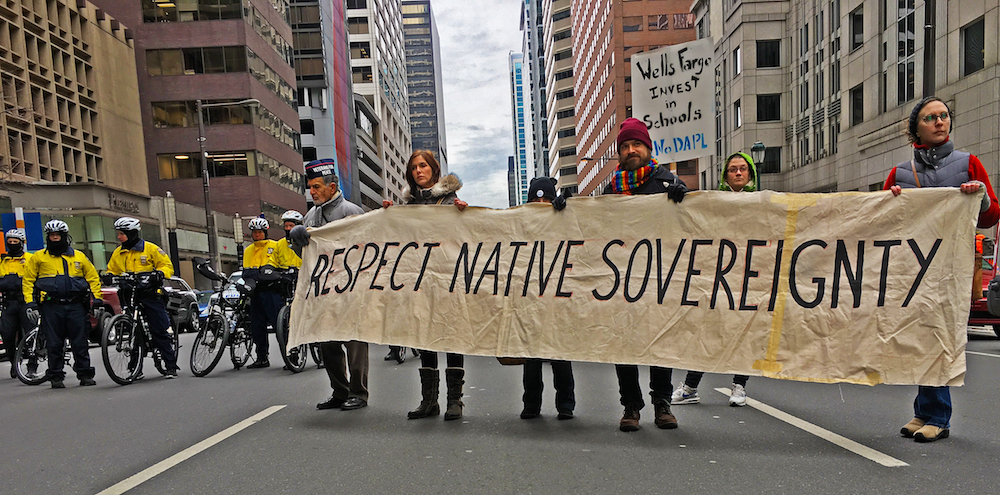A North Dakota federal judge dismissed Energy Transfer’s racketeering lawsuit against Greenpeace and all its co-defendants in a sharply worded ruling issued today, finding that the pipeline builder’s allegations fell “far short of what is necessary to establish a [racketeering] claim.”
In August 2017, Energy Transfer filed a Racketeer Influenced and Corrupt Organization (RICO) Act civil complaint against Greenpeace and other environmental groups who had opposed the company’s Dakota Access pipeline, claiming that the protests had caused $300 million in damages (and requesting three times that amount from the defendants).
Today’s ruling flatly rejected Energy Transfer’s claims.
“Donating to people whose cause you support does not create a RICO enterprise,” District Judge Billy Roy Wilson wrote in a terse 12-page opinion dismissing all state and federal claims in the suit. “Posting articles written by people with similar beliefs does not create a RICO enterprise.”
The company labeled opponents “eco-terrorists” in its 187-page complaint, DeSmog reported at the time; Greenpeace responded that the lawsuit should be considered a Strategic Lawsuit Against Public Participation (a so-called SLAPP suit) and was nothing more than an attempt to deter legitimate organizing work.
Other civil society organizations agreed with Greenpeace’s stance.
“Defendants employed time-honored, lawful means to advance their views, protected by core constitutional rights of free speech and association,” the American Civil Liberties Union (ACLU) wrote in a friend-of-the-court brief objecting to Energy Transfer’s (then Energy Transfer Partners, or ETP) claims of racketeering, defamation, and conspiracy. “Under ETP’s theories, ordinary political speech that runs counter to a corporation’s business interests could expose the speaker to enormous, unwarranted liability.”
Judge Wilson ruled today that Energy Transfer’s lawsuit could not go forward, dismissing all of the federal claims with prejudice (so that they cannot be re-filed), writing that “any additional amendments [by the plaintiff] would be futile.” He also dismissed the state claims, though without prejudice.
Energy Transfer said it planned to pursue futher action in state court, given that the federal judge had declined to hear their state law claims. “We are disappointed, but because the judge dismissed the state claims without deciding their merits, we intend to quickly pursue those in the appropriate venue,” Lisa Dillinger, an Energy Transfer spokesperson, said in a Friday email to DeSmog.
The federal judge dismissed Energy Transfer’s allegations of “wire fraud and mail fraud” in a single sentence. “There appear to be problems with both causation and the fact that most (if not all) of the alleged ‘false and sensational’ claims are either subject to debate, matters of opinion, or inconsequential.”
The judge’s Valentines Day 2019 ruling describes the case’s history, observing that claims against two of Greenpeace’s co-defendants were dismissed in July. Plaintiffs then added individual defendants, named in today’s ruling as “Greenpeace’s employee Charles Brown, and alleged protesters Cody Hall, Krystal Two Bulls, Jessica Reznicek and Ruby Montoya.”
“This is a huge victory not just for Greenpeace but for anyone and everyone who has ever stood up against powerful corporate interests,” Greenpeace USA General Counsel Tom Wetterer said in a statement.
“Today’s decision to dismiss Energy Transfer’s baseless lawsuit against Greenpeace and others sends a clear message to companies trying to muzzle civil society that corporate overreach will not be tolerated,” he said. “It is also a check on corporate efforts to silence dissent.”
The ruling comes just one month after RICO claims against Greenpeace by Resolute Forest Products –- a case also filed by attorneys from Kasowitz Benson Torres (a law firm used by President Donald Trump) – were similarly dismissed in January.
Greenpeace hailed the federal court decision as showing that, in their words, “[j]ustice has been served.”
“We must and will continue to hold Energy Transfer accountable for its corporate behavior on current risky pipeline projects like Bayou Bridge,” Wetterer said, referring to the Energy Transfer oil pipeline being built in Louisiana, “where the company is continuing to use private security to intimidate protestors and has aggressively used eminent domain laws to secure land.”
UPDATED: This piece has been updated to reflect comment by Energy Transfer.
Main image: An anti-Dakota Access pipeline protest in Philadelphia rallies in solidarity with the concerns of Indigenous peoples. Credit: © Laura Evangelisto
Subscribe to our newsletter
Stay up to date with DeSmog news and alerts






